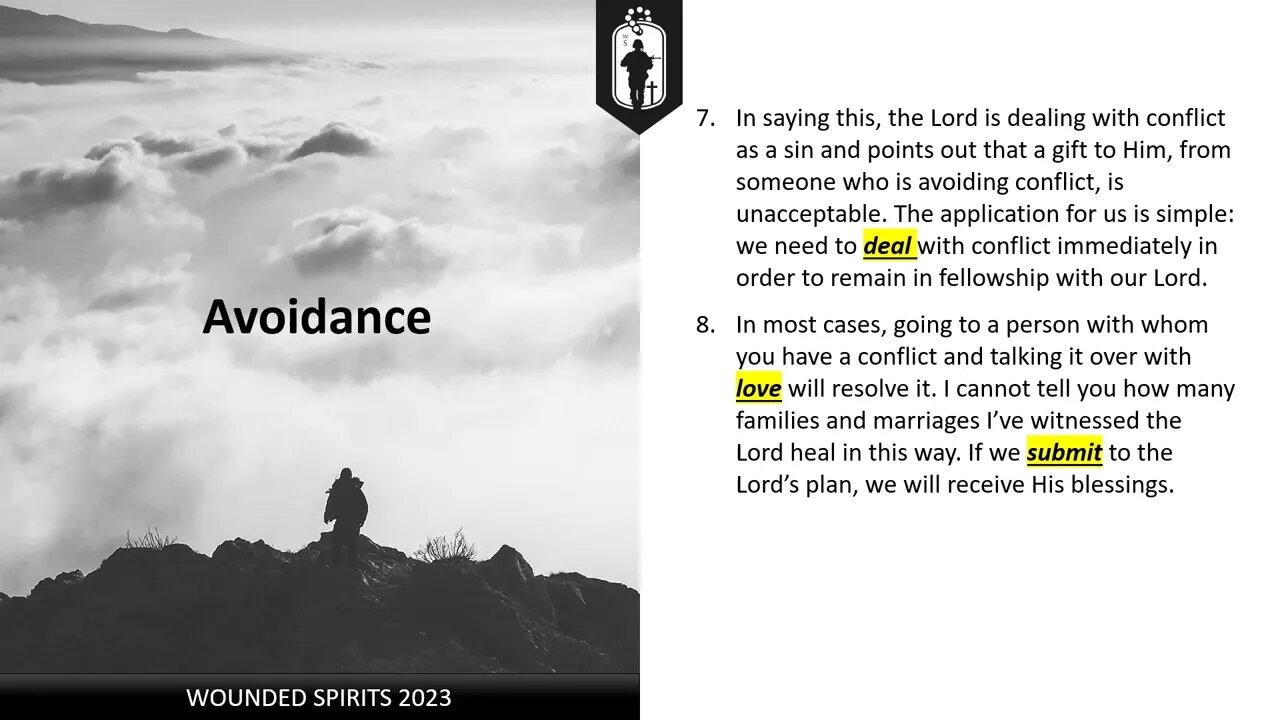Premium Only Content

PTSD #10 - PTSD and Relationships - Conflict - Apathy - Self Harm
Doug Carragher from Wounded Spirits Ministries talks about PTSD.
PTSD Conference: Chapters 13 through 15 in the workbook.
You can download the workbook and follow the accompanying notes at: tinyurl.com/StudyPTSD
Avoidance: Avoidance/avoidant coping or escape coping is a maladaptive coping mechanism characterized by the effort to avoid dealing with a stressor. Coping refers to behaviors that attempt to protect oneself from perceived damage. A person who suffers from PTSD is more than twice as likely to divorce or separate from their spouse. The inability to handle conflicts is a major cause of divorce.
God created us for relationships. Unresolved conflict robs us of the joy that healthy Christian relationships bring.
Conflict is inevitable. No relationship of any type is immune. But when we deal with conflict biblically, it can serve as the catalyst that fixes the relationship. The Lord dealt with conflicts head-on and immediately. “Therefore if thou bring thy gift to the altar, and there rememberest that thy brother hath ought against thee; leave there thy gift before the altar, and go thy way; first be reconciled to thy brother, and then come and offer thy gift.” ~Matthew 5:23–24.
The Lord deals with conflict as a sin and points out that a gift to Him, from someone who is avoiding conflict, is unacceptable. We need to deal with conflict immediately in order to remain in fellowship with our Lord. The Lord looks at conflict and hates it; He wants it resolved, for the sake of fellowship with His people.
In most cases, going to a person with whom you have a conflict and talking it over with love will resolve it. If we submit to the Lord’s plan, we will receive His blessings. There is no excuse to live with unresolved conflict. He gives a way out. Follow your orders and move out smartly. Trust Him and implement His plan. Matthew 18:15–17. First, if there is a person you’re having a conflict with, go to them as soon as possible and address the issues face to face. Avoid involving anyone else. Next, if you cannot resolve the disagreement, grab a couple of folks from church and try to resolve the problem. If the person still does not respond, give it to the Lord. In the Lord’s eyes you are free of the conflict.
Apathy.
The way of the slothful man is as an hedge of thorns…” ~Proverbs 15:19. Many people with PTSD have the symptom of apathy. Apathy is: “Want of feeling; an utter privation of passion, or insensibility to pain; applied either to the body or the mind.”
Apathy - laziness, slothfulness, or indifference - is the opposite of God’s design for our lives. Apathy is giving up, and that never is acceptable.
SELF-HARM/SELF HANDICAPPING
Definition of Self-harming refers to a person harming his/her own body on purpose. Other terms for self-harm are "self-abuse" or "cutting." Overall, a person who self-harms does not mean to kill himself or herself. Self-handicapping behaviors (impulsive behavior) refers to a self - sabotaging behavior.
1 Corinthians 6:19 - 20 - “What? know ye not that your body is the temple of the Holy Ghost which is in you, which ye have of God, and ye are not your own? For ye are bought with a price: therefore glorify God in your body, and in your spirit, which are God’s.”
2 Corinthians 6:16 - …ye are the temple of the living God; as God hath said, I will dwell in them, and walk in them; and I will be their God, and they shall be my people.
Mark 5:5 - And always, night and day, he was in the mountains, and in the tombs, crying, and cutting himself with stones.
Leviticus 19:28 - Ye shall not make any cuttings in your flesh for the dead, nor print any marks upon you: I am the LORD.
About 2% to 6% engage in self-harm some point in their lives. Rates of self-harm are higher among those in treatment for mental health problems.
Often those who self-harm have low self-esteem, and they do not tend to express their feelings. Self-harmers, as compared to others, have more frequent and more negative feelings such as fear or worry, depression, and aggressive impulses. The most common reasons people do self-harm are to distract themselves from painful feelings or to punish themselves.
Cutting, skin-carving, severe scratching, head-banging, and punching oneself are some of the most common methods of self-injury.
Self-handicapping behaviors: Impulsive behaviors are those that occur quickly without control, planning, or consideration of the consequences of that behavior. Impulsive behaviors tend to relate to immediate positive consequences (for example, relief from emotional pain).
Bible Answers - Verses on help and healing: “He healeth the broken in heart, and bindeth up their wounds.” ~147:3. “Trust in the Lord with all thine heart; and lean not unto thine own understanding. In all thy ways acknowledge him, and he shall direct thy paths.” ~Proverbs 3:5-6. “I can do all things through Christ which strengtheneth me.” ~Philippians 4:13.
-
 1:27:43
1:27:43
Graham Allen
2 hours agoJoe Rogan Warns The World About WWIII! Make Military Great Again! + Elon Is Buying MSNBC?!
46.5K60 -
 LIVE
LIVE
LumpyPotatoX2
23 hours agoGrayZone Warfare: NightOp - #RumbleGaming
980 watching -
 LIVE
LIVE
Matt Kohrs
11 hours agoStocks Pump Higher (COIN, MSTR & TSLA) || The MK Show
1,009 watching -
 DVR
DVR
Neil McCoy-Ward
1 hour agoThey've Lost Their Minds...
2 -
 35:37
35:37
BonginoReport
4 hours agoCNN Defends Feds Who Put Tulsi on Terror Watch List (Ep.92) - 11/25/24
59.9K84 -
 LIVE
LIVE
G2G Gaming Channel
2 hours agoMonday Smite Fix! #RumbleTakeOver #RumbleGaming
353 watching -
 LIVE
LIVE
Jeff Ahern
2 hours ago $3.28 earnedMonday Madness with Jeff Ahern (6am Pacific)
491 watching -
 LIVE
LIVE
PudgeTV
13 hours ago🔵Vigilante Nights - Batman: Arkham Origins | Live Playthrough Pt. 5
123 watching -
 15:21
15:21
Degenerate Jay
16 hours ago $8.20 earnedThe Mystery Of Silent Hill 2's Strange Photos Has Finally Been Solved
43.7K9 -
 9:47
9:47
Cooking with Gruel
20 hours agoMastering Potato Gratin
20.7K27